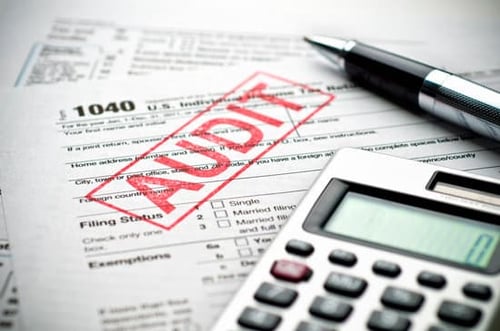Powell Tax Law Blog

IRS Trouble for Contractors: Common Triggers & How to Avoid Them
If you're self-employed in Texas, whether you’re a freelance designer in Austin, a gig worker in Houston, or a contractor working oilfield jobs, you already know the benefits of being your own boss. But with that freedom comes a serious responsibility: staying on the IRS’s good side.
Independent contractors are more likely to get flagged by the IRS for audits or penalties than traditional employees. Why? Because there’s more room for error - and more temptation for underreporting income or claiming aggressive deductions.
In this blog, we’ll walk through the most common triggers for IRS trouble, how you can avoid them, and what to do if the IRS comes knocking.
What Is a 1099 Contractor?
A 1099 contractor is someone who provides services independently rather than working as an employee. Instead of receiving a W-2, you receive a Form 1099-NEC from clients who paid you more than $600 during the tax year. You're responsible for tracking your own income, paying self-employment taxes, and handling all your own deductions.
If that sounds like a lot, it is. And the IRS knows it.
Why the IRS Watches Contractors Closely
Unlike traditional employees, independent contractors don’t have taxes withheld automatically. This means it’s up to you to report every dollar and pay quarterly estimated taxes. Because of this, the IRS pays extra attention to 1099 income to ensure everything is reported and paid correctly.
And unfortunately, a few common mistakes can easily trigger an audit—especially in a state like Texas, where many people work independently in oil and gas, tech, real estate, and construction.
Common Triggers for IRS Scrutiny
Understanding what raises red flags can help you avoid a costly audit. Here are the most common triggers for IRS contractor issues:
Not Reporting All Income
The IRS receives copies of all your 1099s, so if you leave any off your return, it’s only a matter of time before the mismatch is flagged. Even if you didn’t get a 1099 form from a client, you’re still legally obligated to report that income.
Tip: Keep your own records year-round.
Large Deductions Without Documentation
Writing off business expenses is one of the perks of being self-employed, but if your deductions seem too high compared to your income, the IRS may question them.
Tip: Make sure your deductions are reasonable, well-documented, and truly business-related.
Misclassifying Workers
If you hire help—whether subcontractors or assistants—you must classify them correctly. Calling someone a 1099 contractor when they should be an employee can lead to penalties.
Tip: Review the IRS guidelines on worker classification to avoid trouble.
Missing Estimated Tax Payments
Self-employed individuals are required to pay estimated taxes quarterly. Missing payments or underpaying can result in penalties, and may increase your risk of an audit.
Tip: Use accounting software to calculate and track payments.
Red Flags for a 1099 Audit in Texas
The IRS doesn’t publish a checklist, but based on trends and expert analysis, these red flags increase your chances of a 1099 audit in Texas:
- Earning a high income with no W-2s reported
- Inconsistent income year-to-year with large deductions
- Multiple Schedule C businesses with losses
- Frequent cash payments without records
- Being part of an industry known for gig or freelance work
While the IRS handles federal audits, the Texas Comptroller also outlines procedures for state-level tax audits, which independent contractors should be aware of. Learn more about the Texas audit process.
How to Stay Compliant and Avoid Trouble
Here’s how to stay on top of your taxes and keep the IRS off your back:
- Keep Organized Records
- Pay Estimated Taxes on Time
- Work With a Tax Professional
What to Do if the IRS Contacts You
Getting a letter or phone call from the IRS can be nerve-wracking, but don’t panic. It doesn’t always mean you're in serious trouble—but it’s important to respond quickly and appropriately.
Steps to Take:
- Don’t ignore it. Respond by the deadline.
- Gather documents. Pull your tax returns, 1099s, receipts, and bank statements.
- Call a tax attorney. Before you speak to the IRS, speak with someone who can advocate for you.
Powell Tax Law Can Help
Whether you’re worried about a 1099 audit in Texas or just want peace of mind, Powell Tax Law is here to help. We understand how stressful it can be to manage taxes on your own—and we’re ready to step in when things feel overwhelming.
If you’re a contractor facing IRS issues or just want peace of mind come tax season, schedule a free consultation with Steve Powell today.







